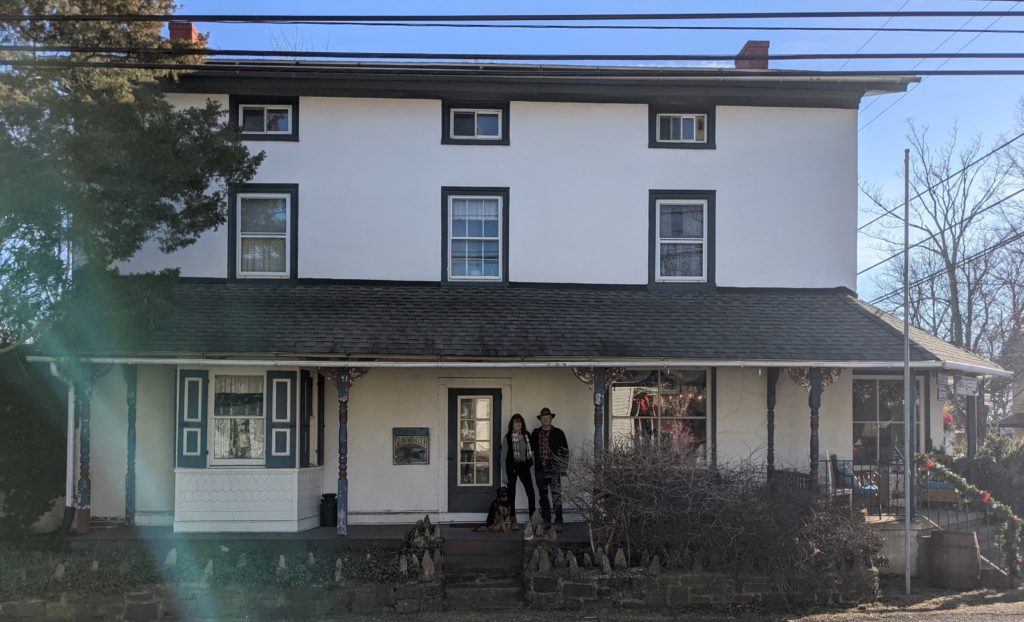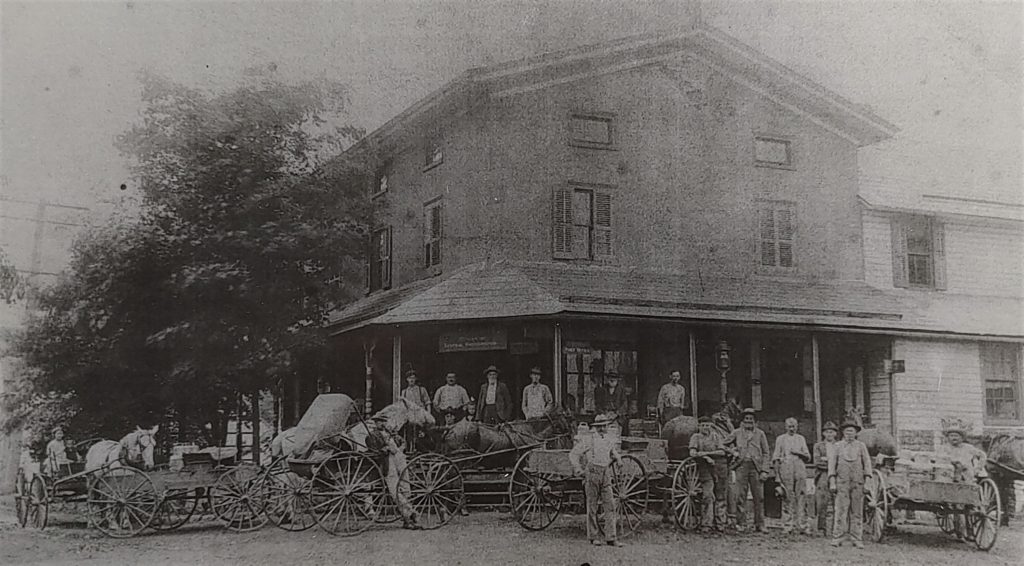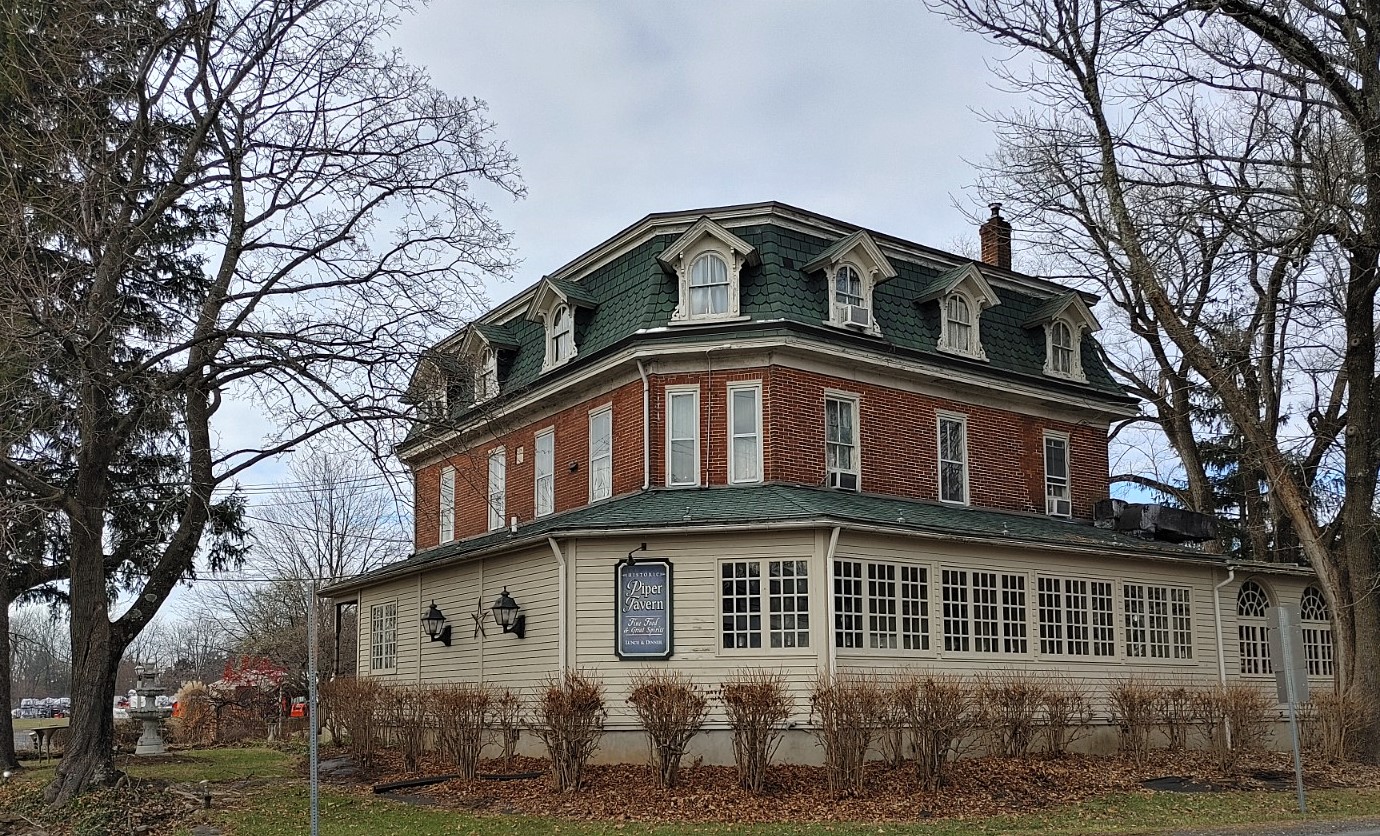She roughed up the infamous Doan Gang at the Pipersville Inn during the Revolution.
Greg and Karen Galster are kindred spirits in their appreciation of history. They live in a 250-year-old former general store in Pipersville at the intersection of Durham and Dark Hollow Roads. Their residence offers historic glimpses of life in the past. The small village of about 60 residents in Bedminster in Upper Bucks is anchored to the American Revolution.
“When we bought the store 35 years ago, the owner gave me a ring with 40 keys and said ‘Congratulations, you’re now the mayor of Pipersville,’ ” Greg smiled. “The key ring didn’t mean we had access to every home in Pipersville, rather it meant the 3-story building with many rooms was once a boarding house in addition to other uses. It’s been a general store, a post office and now an antique/gift shop rented to our neighbor Lynne Gordon who lives in the village. Bedminster Township meetings also once occurred here.”
History is important to the Galsters. Greg is volunteer assistant curator at the National Museum of Industrial History in Bethlehem. You’re also likely to find the couple as I did at home looking over old photos and discussing the rich lore of Pipersville and the Historic Piper Tavern on the opposite corner where many tales are told.

Like the story of Eva Piper.
She and husband George Piper bought the tavern in 1778 and ran it for the next 45 years. As a colonel in the Pennsylvania militia, Piper was at Independence Hall in Philadelphia on July 8, 1776 when Col. John Nixon publically read the Declaration of Independence amid peals of the Liberty Bell.A few years later Piper was away in Newtown under orders from George Washington when two Doan Gang members started making trouble at his tavern. The gang of more than 30 Loyalists had long terrorized the countryside as British spies and bandits. The leaders were five Doan brothers who grew up on the nearby Plumstead farm of their Quaker parents whose religion forbid taking sides in the war. The sons, angered by taxes imposed on the farm to support the rebellion, became British sympathizers.
Inside Piper’s tavern, the two gangsters knew the colonel was away. They started calling Mrs. Piper and her husband traitors. Eva, 20, was in a back room ironing clothes. As the daughter of Tobias Lear who was Washington’s private wartime secretary, she was as supportive of the revolution as her husband. She used her entire dowry of gold concealed in the tavern basement – worth $62,500 today – to buy shoes and clothes for the colonel’s militia.
Now with iron in hand, Eva ordered the gang members to leave the tavern. When they refused, she hurled her 10-pound flat iron at one of them, breaking his arm. Simultaneously she seized her husband’s sword and drove both men out the door. They left while vowing a lawsuit, never filed. Eventually the gang was prosecuted and dismantled. One Doan brother was shot to death and another and his cousin were hung in Philadelphia.
To Greg and Karen, stories like this make living in Pipersville unique. The village named for the colonel was for many years a stagecoach rest stop for travelers bound for Bristol, Philadelphia, Easton or Bethlehem. Among guests believed to have stayed at the inn were Benjamin Franklin, signers of the Declaration of Independence and Philadelphia banker Robert Morris who financed the American Revolution. Others of note were Continental Army Gen. Anthony “Mad Anthony” Wayne and Marquis de Lafayette who stayed a night while en route to a hospital in Bethlehem after being wounded in the Battle of Brandywine. After the Revolution, a frequent guest was Stephen Girard, Philadelphia financier whose purchase of U.S. bonds sustained the American military in the War of 1812.
The tavern was a favorite vacation retreat for deposed Spanish King Joseph Bonaparte (Napoleon’s brother). While in exile in Bordentown, N.J., Joe and a large retinue booked every summer in the early 1800s for week-long fishing trips in Upper Bucks. In modern times, best-selling author and Pipersville resident James Michener frequented the tavern where he signed a copy of his bestselling book “Hawaii” for the Galsters.

Aside from the general store and the tavern, the village is known for its non-denominational chapel with bell tower built in 1886, later to become the town’s library. A clothing business founded in Pipersville by Amos Fretz became a leading county business under the management of son William F. Fretz. By the 1930s, he designed and built a local dairy show barn for his Guernsey cattle that set the pattern for such barns throughout the U.S.
The village of Pipersville and its older homes and structures preserve the town’s colonial charm to the Galsters’ delight. As Greg put it on my visit, “Karen and I are history buffs and enjoy anything about local history.”
***
Sources include “Colonial Inns and Taverns of Bucks County” by Marie Murphy Duess published in 2007, and “Place Names in Bucks County Pennsylvania” by George MacReynolds published in 1942.
Carl LaVO, a veteran deep diver, is author of 4 books on U.S. submarine history published by the Naval Institute Press in Annapolis. He’s also the author of two books on Bucks County history. He can be reached at carllavo0@gmail.com

